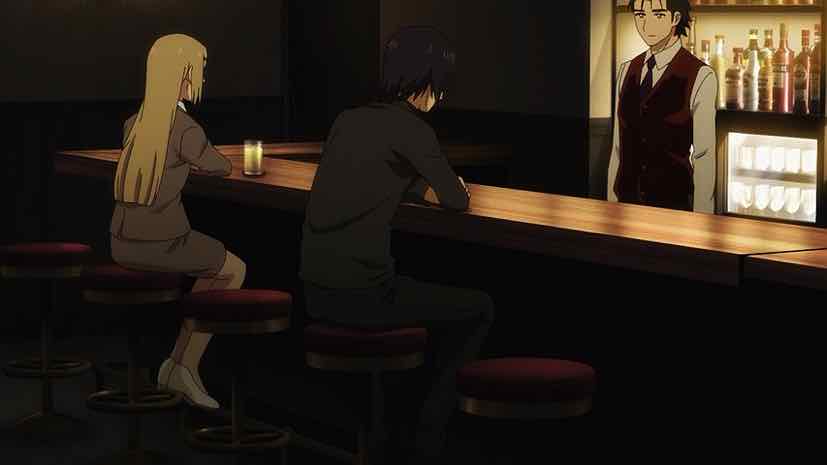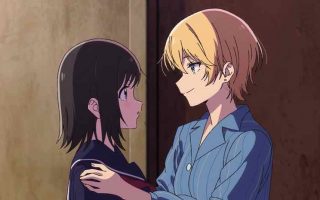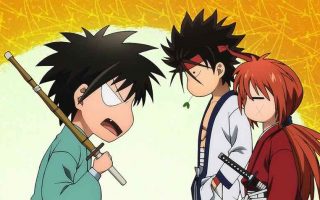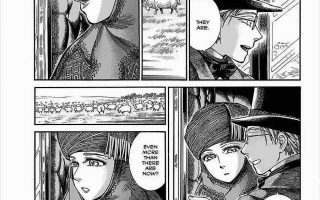Let me just say up front, I wasn’t a huge fan of the last episode of Bartender. It was pretty good, but a couple of the big payoff moments kind of whiffed for me. On the heels of what was probably the best three-episode run of the series, I didn’t think this was on that same level. That said, however, one passage here really clicked with me. That was the one where Ryuu and Taizouu were playing catch, and Taizou referenced a poem. Or a song, I wasn’t sure at the time. I was unfamiliar with it but it resonated in a big way. Turns out it’s called Hana wo Motte, Ai ni yuku (“With Flowers in Hand, I Go to Meet You”), by Nakada Hiroshi (thanks to Princess Usagi for finding it for me).
I could quote a passage, but the whole thing is so beautiful (she tells me even more so in Japanese) that I thought I’d share the entire thing.
On a spring day, I come to see you.
You are the one who is gone.
You are the one who is nowhere to be found.
I go to see the person who is nowhere to be found.
With clean water,
And beautiful flowers in my hand.
Is he/she nowhere to be found?
No, says the one who is gone.
It is not that they are nowhere.
They are not going anywhere.
They are always here.
They stopped walking.
I stopped walking,
I learned something for the first time.
Walking is going somewhere other than here,
Far away, far away, far away,
I used to think that walking meant going somewhere far, far away, far, far away.
I realized that it was not so,
I realized that it was not so until after I died. No more,
I’m not going anywhere,
I was never going to go anywhere or far.
When I realized that,
I am here now,
This is where I have come to,
the furthest place I have ever been.
The furthest place from this world,
is really the closest place to this world.
is really the place closest to this world.
To live is to grow old.
When you die, you don’t age.
My first friend in life
My first friend in life
still ten years old.
My mother, who died
My mother, who died of an illness,
died and became well again.
It is not death, but
left behind in me.
I believe in the memories that she left behind in me.
What do you think words are?
A feeling that can never be put into words,
that can never be put into words, are here.
Even with people I never spoke to before,
I learned that I could talk to people I never talked to,
I learned that I could talk to people I had never talked to before.
The branches of the trees in spring
Their branches are competing with each other,
to grasp the misty sky.
I’m coming to see you on a spring day.
With clean water,
and beautiful flowers in my hands.
I obviously can’t give Bartender credit for writing that. But I can give it credit for having the good taste to quote it. And what’s more, to do so in a context that really lends power to it. Taizou is talking about his dead son of course, and playing catch is a way of expressing his regret over missed opportunities. And in doing so he wonders if he’s creating a memory in the mind of Ryuu, which will stay with him after he’s gone. It’s a grace note of the sort anime almost never delivers, and I find myself quite laid low by what Nakada has written – it’s very deep and very powerful.
I’m not that nuts for the way the story itself wrapped up, to be honest. The bit with Kurosawa-san the novelist was too convenient and resolved too easily to have any real impact. And the lesson Sasakura-san takes from it is that he should leave Edenhall and go to the Cardinal, but it’s OK if he takes the name and the sign with him? I don’t get the sentiment, to be honest. I mean, what the hell difference does that make? Maki-san is still out a bar, and Sasakura has still left behind the place with all those memories the bartender himself can’t make.
To be honest though that seems like pretty trivial stuff compared to the sentiments expressed by Nakada. And I have to be grateful to Bartender for making me aware of him, which I wasn’t, and for making me feel something really deeply as a result. There is a certain mysticism to the role of the bartender, and it transcends cultural lines. And this series really gets that. There were definitely some valleys and the self-promotion by Suntory was very obnoxious at times. But it was nice to see a show about adults and adult problems, and a cultural phenomenon rarely explored in animanga getting a chance to shine.
The post Patron Pick Spring 2024: Bartender: Kami no Glass – 12 (End) and Series Review appeared first on Lost in Anime.




